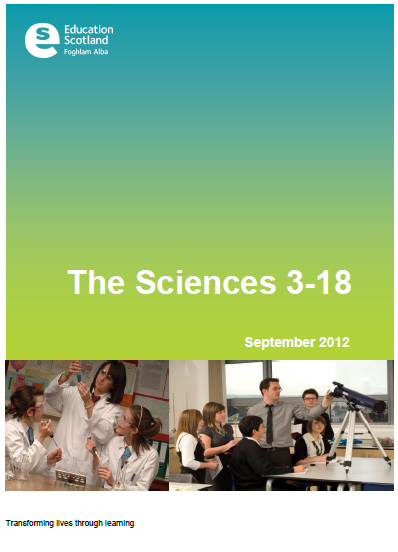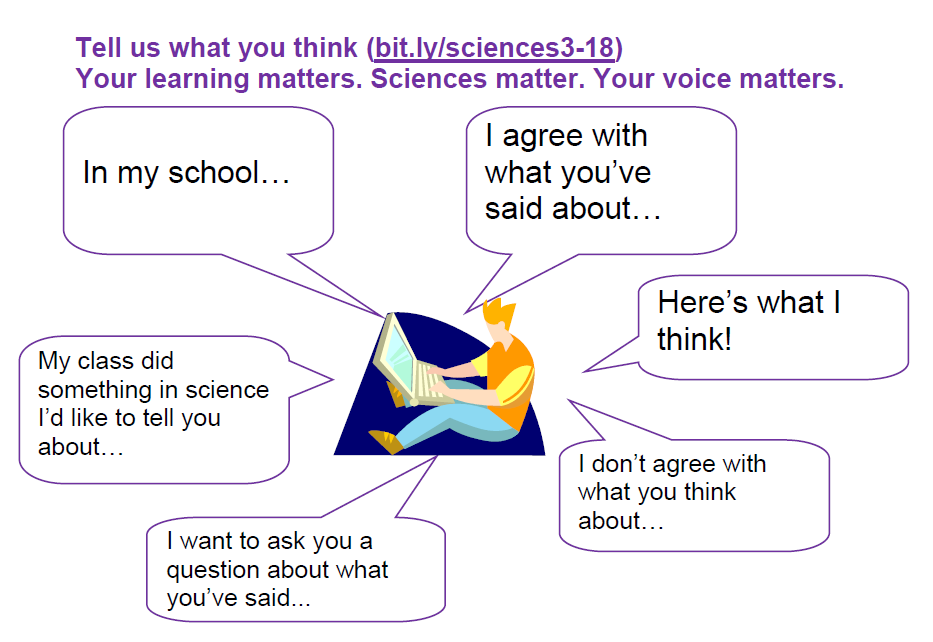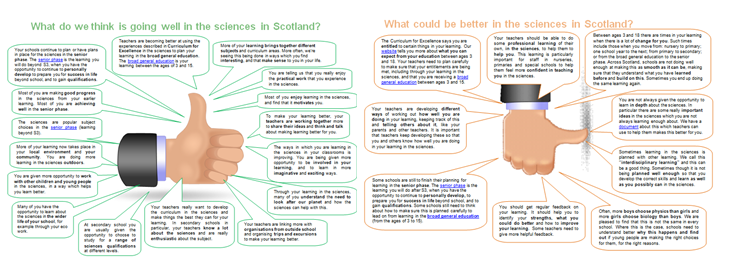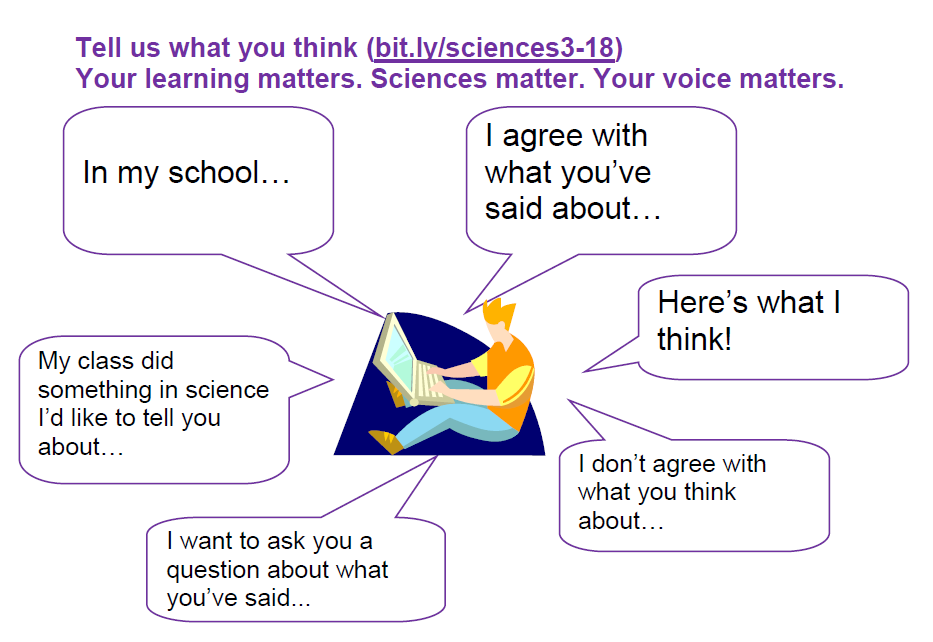At our first face-to-face conversation day in December 2012, delegates heard from young people and practitioners, before joining in discussion in groups to review the key strengths and aspects for development from the Sciences 3-18 Curriculum Area Impact Project report. Groups were asked to consider, what are the key priorities for transforming sciences education over the next 3 to 5 years? Groups discussed key priorities for sciences education, reflecting on the report’s findings and on their own views. We shared these discussions in our 23rd January post.
In the afternoon session, groups selected one of the priorities to explore in more dept h, using the Implento tool. Almost all groups chose the same issue – raising confidence of practitioners teaching sciences within the broad general education – and through the afternoon sessions identified actions to help achieve this were discussed.
h, using the Implento tool. Almost all groups chose the same issue – raising confidence of practitioners teaching sciences within the broad general education – and through the afternoon sessions identified actions to help achieve this were discussed.
Below are the discussion notes, in the delegates’ own words:
We decided to work through the following action:
Boosting confidence of practitioners teaching sciences within the broad general education
We identified the following worst fears and outcomes from this action:
status quo; learning and teaching does not improve; teaching to the test is the norm and learners are exposed only to content without higher-order thinking skills; lack of scientific inquiry;
primary sector not including sciences;
science taught is less topical, and lacks creativity; teaching is in discrete subjects and chunks;
children and young people are less interested, and less confident, in STEM subjects; uptake falls; children and young people have poor scientific literacy, general population is less scientifically literate;
staff feel overwhelmed and disillusioned; loss of practitioners from the profession;
political demand for specialists, diminishing resources;
the skills gap increases; Scotland’s economy suffers, low-tech economy unable to support high-tech business;
decline in life chances, choices and opportunities for young people.
The following actions were suggested to recover from this negative picture:
review, gather evidence, revisit the programme of support; clear and concise documentation for educational matters;
ensure greater accountability;
address leadership weaknesses at all levels—including continuity and school and council level; ITE and GTCS working together to promote strong leadership;
work collaboratively to identify and build body of excellent practice; practitioners involved in building support networks, peer learning and support; practitioners and resources updated; professional learning for and by practitioners becomes outcome and impact-based;
ensure high-quality learning and teaching with on-going professional learning, accompanied by quality dialogue about learning and teaching; use of professional learning communities, for example teacher learning communities; encourage practitioners to undertake classroom based research;
engage with learners and parents to enthuse about science before it becomes a chore; emphasise skills in science to meet industry needs and enthuse learners;
consideration of assessment methods; is the test worthwhile? Is it testing what matters? Learners able to self-select evidence of learning; change community ideas of value of the test by working together;
advantageous tax rates for new, high-tech businesses.
We saw the following positive outcomes as real possibilities:
science for all—not elitist;
Scotland established centre of excellence for science with room for diversity;
better communication and collaboration across all sectors;
increased uptake in STEM by all young people; increase in males in biology and females in physics;
children and young people being given, accepting and eventually demanding responsibility for their own learning; practitioners learning from children and young people with informed debate between learners and staff; children and young people talking about science and more confident;
learners exhibit increased curiosity, creativity, skills development, confidence; increased literacy and scientific literacy;
confident and enthusiastic staff, meeting the needs of individuals, with the confidence to apply science to every-day events;
scientific thinking informs other subjects; clearer natural interdisciplinary learning and understanding; science is relevant, and genuinely inquiry-based;
engaged learners and communities; better parental engagement and understanding of science.
The following were suggested as ways to build on the positive outcomes:
re-identifying the priority: the learner at the centre and development of the four capacities; implementation in an holistic way maintaining performance and enthusiasm; education authorities working together;
collaborating closely between industry and academia to reinforce shared goal outcomes, ES role in encouraging and supporting this;
promoting the development of school leadership;
developing learning communities in education authorities and online; developing mentoring and peer support within education authorities; continue to support publication of reports by online engagement;
creating a portal of research for practitioners and commissioning independent research;
sharing good practice and parental involvement that is apparent in early years to continue into all sectors of education; sharing excellent practice and identifying “champion” schools;
exemplifying excellence in learning and teaching; filtering and recommending practical classroom resources; exemplification of science investigation and inquiry within broad general education;
developing shared understanding of relevant skills, skills progression and how to develop these skills; emphasise development of higher-order thinking skills and build these into National 4 and 5;
sharing lessons learned in the sciences across other curriculum areas;
planning for contextualised learning with the big ideas of sciences understood; planning across four aspects of the curriculum, and for 3-18 in a seamless way;
ensuring professional learning has a focus on the national perspective and linking to national agenda, with local quality assurance of provision;
reviewing ITE selection processes.
Education Scotland has licensed the Transition Leadership tools and the Three Horizons toolkit for the specific and sole purpose of improving Scottish Education and the partner services that support it. We are delighted to have partnered the following people and organisations in this venture: Executive Arts Inc.; James R. Ewing, ForthRoad Ltd.; International Futures Forum and Graham Leicester.









